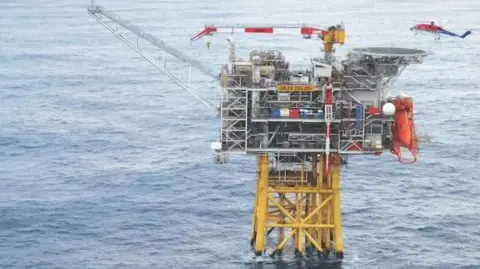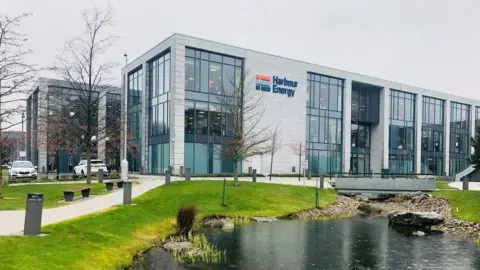Oil and gas firm plans to cut 250 jobs in Aberdeen
 Harbour Energy
Harbour EnergyThe UK's largest oil and gas producer has said it expects to cut a further 250 jobs in Aberdeen.
Harbour Energy said it had launched a review of its UK operations and had to take "difficult steps", blaming regulation and "punitive" government measures.
The UK government said its thoughts were with any workers affected by the "commercial decision".
Aberdeen and Grampian Chamber of Commerce (AGCC) described the news as a "devastating blow".
Harbour Energy had previously announced the loss of 350 UK onshore jobs in 2023.
Harbour Energy has been a vocal critic of the Energy Profits Levy, known as the windfall tax, introduced by the Conservative UK government in 2022 and extended after Labour came to power last year.
The UK government said at the time it was strengthening the tax to ensure North Sea oil and gas producers contribute their fair share towards the energy transition.
It has also pointed to its decision to headquarter Great British Energy in Aberdeen and establish a national wealth fund to help unlock investment in renewables.
But Harbour Energy has claimed it faces excessive taxation which has wiped out profits and undermined investment in its North Sea operations.
Scott Barr, managing director of the firm's UK business, said a review was expected to result in 250 job losses in Aberdeen - about a quarter of its workforce in the city - in addition to the 350 job cuts previously announced.
He said: "The review is unfortunately necessary to align staffing levels with lower levels of investment, due mainly to the government's ongoing punitive fiscal position and a challenging regulatory environment."

The issue was raised at Prime Minister's Questions, with SNP Westminster leader Stephen Flynn accusing Sir Keir Starmer of "destroying jobs in Scotland".
He said: "That's 250 jobs in my constituency gone in the blink of an eye and do you know who they blame, Mr Speaker? They blame the policies of the Labour Party."
The prime minister said "nobody wants to see job losses", but accused the SNP of trying to "distract from their disastrous record" after nearly two decades in government.
The Conservative leader Kemi Badenoch also raised the Harbour Energy job losses.
The prime minister accused her of being a "climate defeatist".
'Tip of iceberg'
A UK government spokesperson said: "Our thoughts are with any workers affected by this commercial decision, and we will do everything in our power to support workers and communities.
"The government has reformed the Energy Profits Levy to support investment and give industry certainty and stability."
Russell Borthwick, chief executive of Aberdeen and Grampian Chamber of Commerce, said: "This is a devastating blow for the 250-plus families directly affected - and I fear it is just the tip of the iceberg."
In March, the UK government launched a consultation on plans to replace the windfall tax on the profits of energy companies when it comes to an end in 2030.

The energy transition, from fossil to clean and green, is not going smoothly.
There are significant job losses from oil and gas: partly because it is in long-term decline, partly because the oil price has dropped by nearly a third since mid-January, costs have gone up, and also – as cited today by Harbour Energy – because UK government policy is against it.
Tax on profits runs at 78% and the Labour government is refusing to grant new drilling licences.
The industry complains that this accelerates the momentum towards winding down production, despite evidence that the UK will continue to need oil and gas for decades to come, and despite the higher carbon output linked to importing oil and gas.
The UK government's argument is that low-carbon energy ought to pick up where oil and gas are in decline.
But that's not looking good either. Harbour Energy is also reviewing its carbon capture project on Humberside, blaming delayed government support.
Orsted, the Danish company with a hard-won contract guaranteeing a minimum price, has halted one of the biggest of North Sea wind farms - Hornsea 4.
Costs are also being blamed by renewable energy company Drax on its decision to halt a big project to expand hydro generation on Ben Cruachan near Oban.
Investors more widely are waiting for important market signals from the UK government and regulator Ofgem before they commit many billions of pounds.
